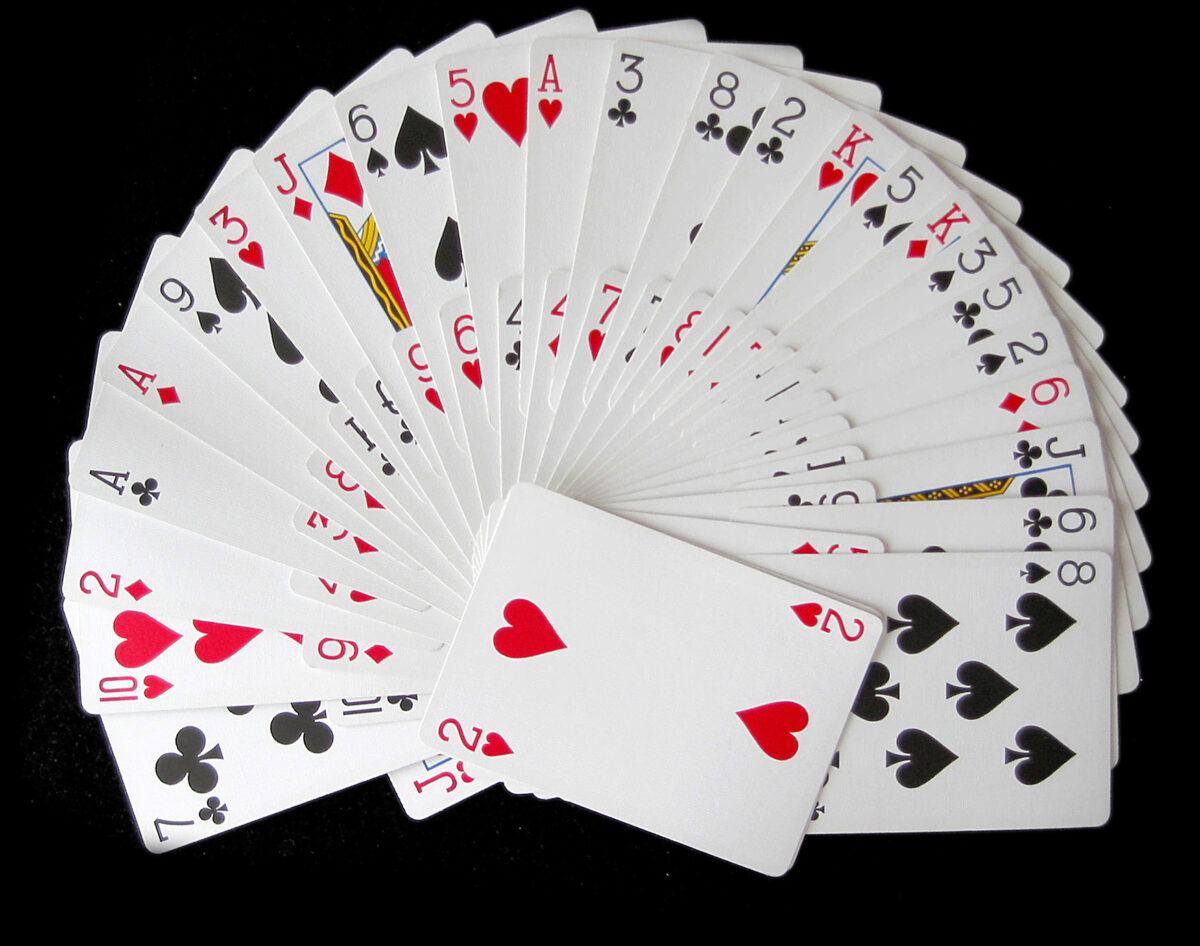It’s the middle of March. My mother is sitting in a hospital bed while I try to shuffle a cheap used deck of cards from the Tropicana found in a drawer. We’re 2,000 miles away from Las Vegas in a rehab unit on the top floor, and we’re both sick of this place because she’s been in the same building since the ambulance rushed her here two days before Christmas.

The cards are thick and stiff and go everywhere when I try to riffle them, so I end up shuffling the deck one-by-one, placing the top card on the bottom, one after another, until all 52 find a new spot.
I’m reminding Theresa the rules of Gin as I go, a game she taught me when I was a child, sick with an ear infection, and I tell her of the rhyme I used to remember the order of action: “Pick up, make a play, throw away.”
She says: “I remember” and instantly, I’m back at the old dining room, trying to hold all the cards, because we would play Gin Rummy 500 where you can scoop as many discards up as you want, as long as you’re able to make a meld or two, and I couldn’t resist scooping them all.
She’s only a couple weeks out from having a small stroke caused by her heart churning out of rhythm, but she picks up the cards one by one as I lay them down on the bedsheet until 10 is in her hand.
I explain straight Gin and Oklahoma and how and when to knock, and she tells me she’s not going get it even as she swiftly organizes her hand. I’m prepared to get my butt whipped, and hope for it, and smile at the nonsense I’ve dealt to myself.
Sitting there, I nearly had forgotten about the stroke, and if you didn’t know it, wouldn’t be able to tell. But then again, it was only one of about a dozen major problems Theresa had gone through since September, starting with afib before getting COVID, which she never really kicked until weeks after she wound up on the floor confused and barely able to breath.
That was two days before Christmas, and was only the start.
She dealt with set-backs every day or two, from a UTI caused by the catheter, confusion and warning signs of dementia caused by carbon dioxide building up in her blood, the stroke, all the side-effects from the gallons of medicines she needed in order to slow her heart rate and increase her blood pressure which often dipped into ranges that scared us all, and so much liquid building up in her chest, making it uncomfortable to eat and even breath.
In the days of lucidity, she’d wonder how much the bill would be.
“Way over $1 million,” I’d say.
“At least.”
This was her second stint on the physical rehab floor and, by all measurements, she was doing really well. The exercises were making her stronger, the mental activities were easy and bored the hell out of her, which was a good sign and made the therapist laugh, and they all had hope she’d go home soon.
In fact, through most of it, she’d always manage to crack at least one or two jokes with the staff, even as yet another vein ran away from their piercing needles.
But the last time she was in this spot — days from completing rehab and close to going home — she contacted pneumonia (for the second time), which sent her back into ICU and onto the breathing machine. “Touch and go” is what we were told, like she was an airplane and not a person.
And as her heart churned out of rhythm, so did the thoughts that she’d never come home, or if she did, she would not be the same Theresa, that she’d end up in a facility like her mother, Grace, who, at the very end, forgot the names of her children and grandchildren.
In those days, it felt like I’d wake up and wash my face with panic and despair. I’d sleepwalk from my house to my car to the hospital to the side of her bed, moved more times than I could remember, from ICU to PCU back to a regular room with the 94-year-old woman who shouted all day for “Johnny,” who we gathered, died sometime in the 50s.
But maybe — just maybe — all that was behind us. Maybe — just maybe — this was the end of a journey that just a month before seemed to have no outs or exits except heartbreak.
Rehab was the last stop, and she was almost a graduate. She could now shower and go to the bathroom on her own again. That afternoon, she made a grilled cheese and tomato soup in a kitchen down the hall and “it wasn’t that bad.”
As we start the round, I tell her how I vividly remember playing cards with her when I was a little boy, how I still cannot shuffle and bridge the cards together as good as she could, and how I think the music of that shuffle has altered the direction of my life in some ways.
And then she tells me something I never knew.
It was her father, Tony, who taught her how to play Gin when she was a little girl. Tony, who died a month before I was born, would sit there with his one leg and deal hand after hand to his youngest daughter to pass the time being very poor and very sick.
“This is his shirt,” she says, as she picks up yet another card I threw away.
It’s an old brown flannel job, large for her since she lost 30 pounds. He died 50 years ago. My eyes swell but I stuff the tears all back in. I’m a mess and been a mess and will continue to be a mess, but it’s OK, because I’m playing cards with my mother again.
“I think I have Gin,” she says, and shows me her monster hand, laughing. “I told you I didn’t know what I was doing.”
“And I told you you did,” I say, counting my deadwood, feigning disgust, cheering as hard as possible.


